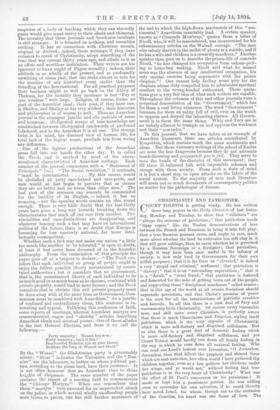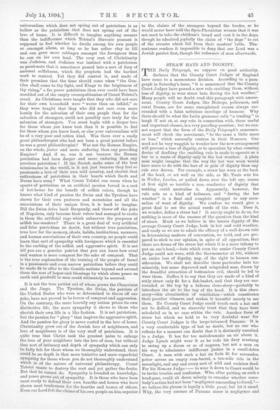CHRISTIANITY AND PATRIOTISM.
COUNT TOLSTOI is getting windy. He has written three long papers in the Daily Phronicle of last Satur- day, Monday, and Tuesday, to show that " villainies " are always the outcome of patriotism;" that patriotism needs "tipsy orgies" like the Toulon demonstrations of love between the French and Russians, to bring it into full play; that a true Russian peasant cares, and ought to care, much more about whether the land he cultivates has soft clay in it that will grow cabbage, than he cares whether he is governed by a Russian Sovereign or a foreigner; that patriotism, though it may have been once useful in the infancy of society, is now only bred by Governments for their own selfish purposes ; that it is far from an "elevated," is indeed a very "stupid and criminal," sentiment ; that patriotism is " slavery ; " that it is an "astounding superstition ; " that it is a "deceit," a "cruel fraud ; " that patriotism is fostered and fomented for the sake of getting taxes out of the people, and supporting those "disciplined murderers" called armies ; that in this age of the world at all events Socialism should supersede patriotism, and that Christ's promise of peace is the cure for all the intoxications of patriotic revelries and hatreds. In all this there is a vast deal of fury and uncommonly little Christianity. Of course every reasonable man, and still more every Christian, is perfectly aware that there is much Chauvinism and Jingoism, styling itself patriotism, which is the very opposite of Christianity, which is mere self-flattery and disguised selfishness. But so also there is a great deal of domestic feeling which is mere self-flattery and disguised selfishness, and yet Count Tolstoi would hardly run down all family feeling in the way in which he runs down all national feeling. Who can read our Lord's lament over Jerusalem, "0 Jerusalem, Jerusalem, thou that killest the prophets and stonest them which are sent unto thee, how often would I have gathered thy children together, even as a hen gathers her chickens under her wings, and ye would not," without feeling that true patriotism is at the very heart of Christianity ? What was the effect of St. Paul's conversion on his patriotism 14 It made or kept him a passionate patriot. He was willing even to surrender his own salvation, if he could thereby have saved Israel, for whom, though not to the exclusion of the Gentiles, his heart was one flame of love. The universalism which does not spring out of patriotism is as hollow as the patriotism that does not spring out of the love of home. It is difficult to imagine anything meaner than the indifference which Tolstoi's Slavonic peasant is supposed to feel whether he dwells among his own people or amongst aliens, so long as he has softer clay to till and can grow more cabbages amongst the foreigners than he can on his own land. The very root of Christianity was Judaism, and Judaism was instinct with a patriotism so passionate that it sometimes passed into a sort of fury of national selfishness, which the prophets had the hardest work to control. Yet they did control it, and made of their promises that the time should come when "the Gen- tiles shall come to thy light, and Kings to the brightness of thy rising," a far purer patriotism than ever could have been moulded out of the empty cosmopolitanism of Count Tolstoi's creed. As Christians were taught that they who did not care for their own household were "worse than an infidel," so they were taught that they who did not care even more keenly for the salvation of their own people than for the salvation of strangers, could not possibly care truly for the salvation of strangers. You must begin with a deeper love for those whom you know beat than it is possible to feel for those whom you know least, or else your universalism will be of a very poor and rotten kind. Was there ever a really great philanthropist who had not been a great patriot before he was a great philanthropist? Was not the Roman Empire, on the whole, juster and more enduring than any preceding Empire? And if so, was it not because the Roman patriotism had been deeper and more enduring than any previous patriotism ? If the Scotch make some of the best missionaries in the world, is it not just because they feel so passionate a love of their own wild country, and cherish that enthusiasm of patriotism in their hearts which Scott and Burns have sung? What Count Tolstoi can mean when he speaks of patriotism as an artificial passion forced in a sort of hot-house for the benefit of selfish rulers, though he knows what kind of passion the Swiss and the Tyrolese have shown for their own pastures and mountains and all the associations of their unique lives, it is hard to imagine. Did the Swiss drive back Burgundy, and throw off the yoke of Napoleon, only because their rulers had managed to excite in them the artificial rage which subserves the purposes of selfish tax-masters There is a great deal of very artificial and false patriotism no doubt, but without true patriotism, true love for the scenery, ideals, habits, institutions, manners, and human associations of their own country, no people could learn that sort of sympathy with foreigners which is essential to the curbing of the selfish and aggressive spirit. It is not till you are a genuine patriot that you can learn how cruel and wanton is mere conquest for the sake of conquest. That is the true explanation, of the training of the people of Israel in a passionate and even narrow patriotism before they could be made fit to offer to the Gentile nations beyond and around them the sort of hopes and blessings by which alone peace on earth and goodwill to men could ultimately be secured.
It is not the true patriot out of whom grows the Chauvinist and the Jingo. The Tyrolese, the Swiss, the patriots of the -United States who were so determined to throw off our yoke, have not proved to be lovers of conquest and aggression. On the contrary, the more heartily any nation prizes its own distinctive life, the more sympathy it shows to those who cherish their own life in a like fashion. It is not patriotism, but the passion for " glory " that inspires the aggressive spirit. And the passion for glory is never rooted in the love of home. Christianity grew out of the Jewish love of neighbours, and love of neighbours is of the very stuff of patriotism. It is quite true that Christ took the greatest pains to enlarge the love of your neighbour into the love of man, but without that sort of intimacy and depth of sympathy which can only be fully felt for those whom we thoroughly understand, there could be no depth in that more tentative and more superficial sympathy for those whom you do not thoroughly understand which. .is of the nature of universal philanthropy. Count Tolstoi wants to destroy the root and yet gather the fruits. But that he cannot do. Sympathy is founded on knowledge, and peace grows out of sympathy. It is those who have been most ready to defend their own hearths and homes who have shown most tenderness for the hearths and homes of others. Even our Lord felt the claims of his own people on him superior to the claims of the strangers beyond the border, or he would never have told the Syro-Pheenician woman that it was not meet to take the children's bread and cast it to the dogs, though he admitted joyfully the claim of "the dogs" to eat of the crumbs which fell from their masters' table. Ma-, sentence renders it impossible to deny that our Lord was a Jewish patriot first, though the redeemer of man afterwards.



































 Previous page
Previous page